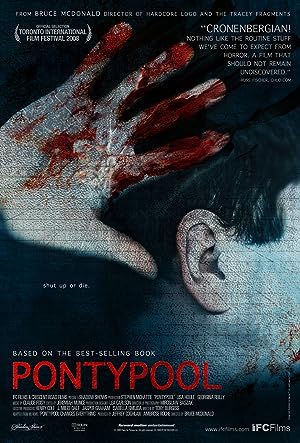I think that Pontypool hit my radar because it made a notable horror movie list, but I have also liked Stephen McHattie since I remembered him appearing on The X-Files. I probably saw him before the nineties, but he became memorable then. I didn’t know much about the film, but a good actor and a horror movie is all I need to get by. I was pleasantly surprised to discover that I accidentally stumbled on a contagion scenario similar to a zombie outbreak, which the author of the book that the movie is based on vehemently denies. His denial is fair because they are not dead, but infected. The way that the virus spreads is unique. Hint: the Tower of Babel may not have been God stamping out a rebellion, but saving humanity from oblivion by confusing their language.
Pontypool is about a shock jock DJ, played by McHattie, who has seen better days and has ended up in some random small town station that was tempted by his fame, but did not read the inflammatory fine print. The film has often been compared with War of the Worlds since most of the action takes place off screen as the few people who work at the radio station get news from the outside from witnesses calling in, other radio stations and the internet. It is not until halfway through the film that you get a first hand encounter with the horror unfolding on a snowy Valentine’s Day in Canada. As a normal day becomes a crisis, the point is not the outside, but how these few individuals react to each other. The movie plays with the idea of the power wielded by McHattie’s voice and explores the corners of what it means to have a profession rooted in language. He has the power to kill or calm. A shock jock could be a terrorist or a hero.
Pontypool has some outstanding moments strewn throughout. There is an obituary montage that features the deceased photographs and depicts the rapidity and scope of the epidemic. The use of sounds to depict the infected horde is suitably creepy. I almost felt the ground shift under me when they leave the sound booth and stop short of going outside, but I don’t think there were any special effects. I think it was simply the acting and the camera work that made me feel the proximity of the infection and as if their world had suddenly leaked into my own. I loved the Armenian doctor.
Unfortunately I did not like the character arc between the two leads, a married couple in real life. The one thing that Power Rangers has over Pontypool is that there was not some sudden tacked on romance, which I retroactively realized was more the point than not in this horror movie. I’ve never read the book so this plot development maybe a perfect adaptation, but it seemed sudden to me. On the other hand, people do have a tendency to hook up quickly when facing his or her mortality so I am probably the only person who has watched this film and critiqued this twist. I did not like it. It made a tense, but interesting dynamic as the two tried to strike the balance of who was in control become cliché and conforming. I preferred when they took turns.
The post credits scene is puzzling even once you understand the rules of how to stop the infection. Where are they? Is this their imagination or real? I think that it may be like the opening. Its significance is its randomness and meaninglessness as a cure to infection. I know that I watched a handful of scenes repeatedly. Even when meaning is elusive and Pontypool is not completely satisfying, it can still be magnetic. Definitely watch it if you like the cast’s work or are into linguistics or a more intellectually stimulating take on the zombie outbreak. Is this a pro Quebec secession film?
Stay In The Know
Join my mailing list to get updates about recent reviews, upcoming speaking engagements, and film news.





